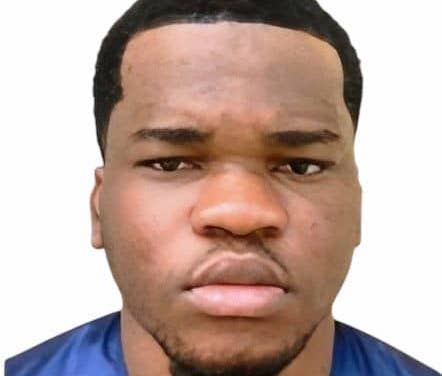The Federal High Court in Lagos on Tuesday jailed a jeweller for refusing to accept naira as a legal tender.
Judge Alexander Owoeye convicted Precious Uzondu after he changed his initial not-guilty plea to guilty on Monday.
Earlier this month, the Economic and Financial Crimes Commission (EFCC) charged him with two counts of rejecting naira and accepting $5,700 last December for the sale of a Cartier diamond bracelet.
Delivering judgment, on Tuesday, the judge found the defendant guilty of both counts, the EFCC said in a statement.
Mr Owoye imposed a N50,000 fine as sentence for the first count.
He sentenced the defendant to four years imprisonment, though with an option of N600,000 fine, for the second count.
He ordered the forfeiture of the Cartier diamond bracelet, the subject of the transaction, to the Federal Government of Nigeria.
PREMIUM TIMES reported that the anti-graft agency, on 5 April, arraigned Mr Uzondu on two counts of accepting dollars instead of naira as a means of payment for a purchase of a Carter diamond bracelet.
The anti-graft agency said the transaction took place on 10 December 2024 in Lagos.
It said Mr Uzondu refused to accept Naira (Nigeria legal tender) “by accepting the sum of $5,700” as a means of payment for a purchase of a cartier diamond bracelet with serial number (12345678), thereby committing an offence contrary to Section 20 of the Central Bank of Nigeria Act, 2007.
Section 20 of the Act criminalises refusal to accept naira as a means of payment for goods and services in Nigeria. However, this only applies in Nigeria and does extend to international trade.
The defendant entered a not guilty plea to the two charges during his arraignment on 5 April, initiating a full trial.
Arrest by undercover agent
Subsequently, the prosecution presented its first witness, Owolabi Jude, an operative of the EFCC.
Led in evidence by the prosecution counsel, H.U. Kofarnaisa, Mr Jude told the court that “the commission received intelligence on the activities of a jewelry company called Unlimited Jewellers Limited, “whose owner is one Uzondu Precious Chimaobi”.
“The company, which deals in jewelry at Atlantic Mall, Chevron Drive, Lekki, Lagos intentionally tags and sells its products in dollars as against the CBN Act, 2007, which stipulates Naira as the only legal tender in Nigeria.”
The witness testified that a covert operation was conducted by an undercover agent of the commission who posed as a customer.
The operative expressed interest in purchasing a diamond bracelet marked at $6,000. He confirmed that the disguised customer bought the item for $5,700.
“The company refused to receive naira and demanded dollars as a means of payment. The payment was made and receipt was issued in dollars . The owner of the company was arrested and taken to the commission’s office,” the witness said.
Change of plea
At the resumed hearing of the case on Monday, the defendant opted to change his “not guilty” plea to “guilty.”
Following the defendant’s new guilty plea, the prosecution lawyer urged the court to admit and rely on the evidence earlier given by the investigating officer to convict the defendant.
The lawyer, Mr Kofarnaisa, thereafter, tendered the defendant’s extra-judicial statement and other pieces of evidence to support the case against the defendant.
The court admitted them all as exhibits.
Mr Owoeye then adjourned till Tuesday for judgement.
Nigeria’s dollarised economy
The dollarisation of Nigeria’s economy, where the US dollar is widely and openly used alongside the naira, has been blamed for contributing to exchange rate instability in the country.
READ ALSO; U.S. ambassador honours Nigeria’s thriving music industry at headies pre-award reception
The practice has also weakened the central bank’s ability to implement effective monetary policies, leading to inflationary pressures, as local prices become increasingly tied to fluctuations in the dollar, making essential goods and services more expensive for Nigerians.
Efforts to de-dollarise the economy, such as encouraging transactions in naira, aim to restore monetary sovereignty and reduce dependence on foreign currency, but require strong policy coordination and economic reforms.
The EFCC’s crackdown on using dollars for transactions is part of the government’s plan to de-dollarise the economy. However, these efforts are seen as insufficient, ignoring large entities that only accept dollars and other hard currencies.
Support PREMIUM TIMES’ journalism of integrity and credibility
At Premium Times, we firmly believe in the importance of high-quality journalism. Recognizing that not everyone can afford costly news subscriptions, we are dedicated to delivering meticulously researched, fact-checked news that remains freely accessible to all.
Whether you turn to Premium Times for daily updates, in-depth investigations into pressing national issues, or entertaining trending stories, we value your readership.
It’s essential to acknowledge that news production incurs expenses, and we take pride in never placing our stories behind a prohibitive paywall.
Would you consider supporting us with a modest contribution on a monthly basis to help maintain our commitment to free, accessible news?
TEXT AD: Call Willie – +2348098788999





